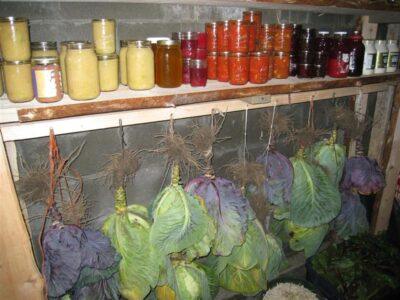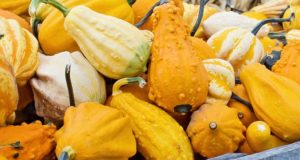If gardeners find spring and summer to be about growing food, they find fall and winter to be more about storing food. The fall season brings bountiful harvest from your own garden as well as inexpensive prices from local farmers’ markets. In winter months, prices on produce inevitably rise. So it makes sense to store as much as you can while fresh produce is bountiful and cheap.
One of the oldest – and easiest — ways to preserve fresh fruits and vegetables through the winter months is with cold storage, also known as root cellaring. In fact, historical records indicate that the aboriginal people of Australia were using the technique of burying food in the ground to preserve it more than 40,000 years ago, and walk-in root cellars started to become popular in England in the 17th century.
What is a root cellar? A root cellar is simply an underground room used for preserving fruits and vegetables for several weeks or months. Many homes have them built into the basement, but they can also be structures separate from the home. The main features of these cellars is that they are cool in temperature, have an appropriate level of humidity and are well-ventilated.
Temperature
Cooler temperatures help to preserve produce by slowing the rate at which they release ethylene gas and therefore slowing the rate at which they go bad – that’s essentially the reason we use refrigeration.
Get Delicious, Nutrient-Dense Heirloom Seeds Here!
The ideal temperature for a root cellar depends in part what fruits and vegetables you plan on storing, but generally speaking it should be between 32 and 50 degrees Fahrenheit.
Humidity
Relative humidity is another important factor in how successful you are with cold storage. Most produce stores best in an environment where the relative humidity is high – between 85-95 percent. While most root cellars will be naturally humid due to their construction, it is still a good idea to include a hygrometer (a device for measuring humidity) in your root cellar.
If you find that your root cellar is too dry, you may increase the humidity by sprinkling water on the floor (if floor is earth or gravel) or packing vegetables in damp sawdust. If the humidity level is too high, it can be lowered by adding barrels of rock salt or by increasing ventilation.
Air Circulation
Proper ventilation is another key element to your root cellar’s success. This allows for greater temperature control but it is also important for controlling the ethylene gases produced by fruits and vegetables being stored. Without a way to escape, these gases would build up and cause the entire contents of your root cellar to rot much more quickly.
At minimum, your root cellar should have one inlet vent and one outlet vent, although you may certainly choose to have more. Inlet vents should be placed low and outlet vents should be placed high. Vents can be closed during extreme outside cold and heat in order to keep the temperature inside more consistent.
What Foods Can Be Kept in a Root Cellar?
When most people think of root cellar foods they think of, well … roots! Carrots, beets, potatoes and onions all store well for several months through the winter. Apples also can stay quite tasty for a long time in cold storage.
An Amazing Breakthrough In Compact Portable Backup Power — Easily Fits In Your Pocket Or Backpack!
What many people may not realize is that, stored properly, you can even have foods like tomatoes (store in boxes in a single layer), cucumbers (in waxed or moist packaging) and cauliflower (wrap in leaves).
How Should a Root Cellar be Arranged?
When stocking your root cellar, it is a good idea to think about air circulation. Shelves should be arranged so that plenty of air can get around your produce; don’t cram fruits and vegetables in like sardines!
If food is stored on the floor, use pallets or blocks to raise it up an inch or so, in order to let air flow underneath.
Foods which produce higher amounts of ethylene gas should be placed higher up and closer to outlet vents. These include apples, pears and tomatoes.
Strong-smelling foods such as cabbages should be wrapped in newspaper in order to prevent other foods from absorbing the odor.
Guarding Against Rodents
One of the biggest problems that can occur with root cellars is a rodent infestation. To prevent this, make sure that all entry points, including vents, are covered with a wire mesh.
Avoid rotten food by inspecting your cellar regularly and removing any food that looks like it’s starting to spoil. This will help keep bacteria from spreading to other food.
Avoid storing canned goods in your root cellar, as the high humidity levels can cause lids to rust.
It takes a certain degree of work, but root cellars can be a great way of preserving the fresh flavors of summer throughout the colder months of the year.
Do you have any root cellar tips? Leave them in the section below:
 Off The Grid News Better Ideas For Off The Grid Living
Off The Grid News Better Ideas For Off The Grid Living





